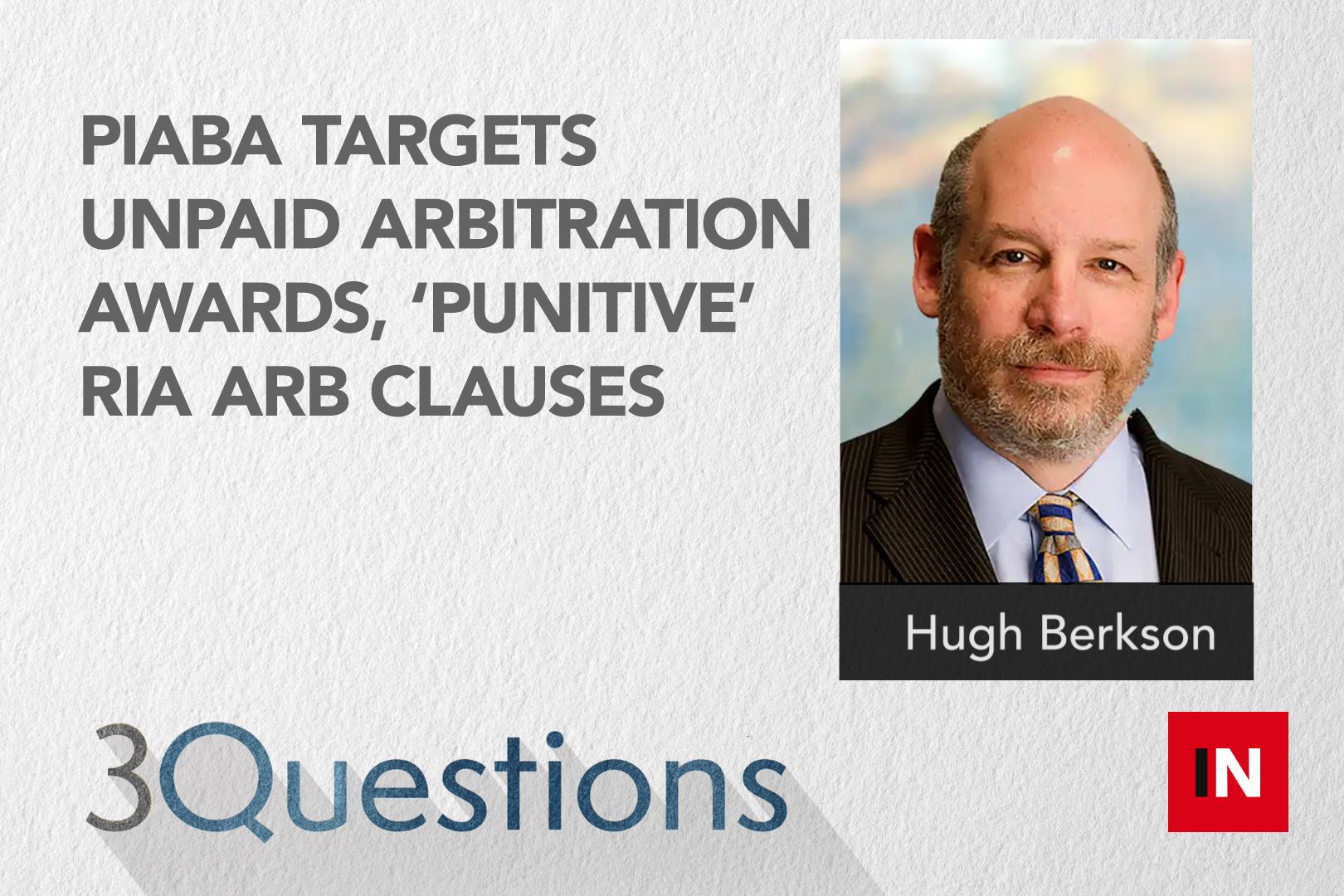Expungement rule no longer works, says NASAA president
Removing customer disputes from brokers’ records should be an ‘extraordinary remedy,’ but the expungement rule no longer works and people are finding ways to get information removed, says new NASAA president Melanie Senter Lubin.
Mark Schoeff Jr. [00:00:03] Welcome to Three Questions, I’m Mark Schoeff Jr., a senior reporter at InvestmentNews. Today, we’re talking to Maryland Securities Commissioner Melanie Senter Lubin. In September, Melanie was elected president of the North American Securities Administrators Association, the umbrella organization for State Regulators. Melanie has been deeply involved in Nassau work for years, and for the next year, she’ll be in charge. Thank you for joining us, Melanie.
Melanie Senter Lubin [00:00:33] Thanks, Mark. And you’re in charge. Might be a little broad, but yeah, I’m going to be. I’m going to be kind of shepherding the organization this year. Okay. Thanks so much for inviting us to participate in your Three Questions podcast. We appreciate the invitation.
Mark Schoeff Jr. [00:00:50] In your acceptance speech in September in Chicago at NASAA’s annual conference, you said expungement reform is one of your priorities. What do you hope to accomplish this year on that issue?
Melanie Senter Lubin [00:01:05] People who know me know that expungement has been a project I’ve been working on for many, many years. You know, I was involved in the original moratorium that went in place back in the 90s and in developing the rule that exists now for addressing expungement issues. Unfortunately, the rule doesn’t work anymore. People know that NASSA’s position has always been that expungement is an extraordinary remedy that should only be allowed under very limited circumstances. Despite our best intentions for everything that’s gone on with this, it’s really gone way beyond that. And people who have an interest in getting information over their record have found ways to work around the rules or work within the rules and get information removed. And it’s being removed when it really is not an extraordinary remedy. It probably, you know, for most reps, if they prevail for one reason or another or aren’t held responsible in an arbitration proceeding, they seek expungement and they’re seeking it both through the arbitration process and through going to court. So it really is way beyond where the expectations were and the information that’s on the system is really important. It’s important to firms when they make hiring decisions and decide whether a rep is too risky to take on. And if the information about what’s happened in the past is no longer on the system, they won’t have access to that information. It’s important to regulators when we make a decision about whether it’s appropriate to license somebody and maybe license somebody with some scaffolding around them, like a conditional registration and some other conditions the firm needs to have in order to supervise. And it’s really important to investors. When they use CRT, they use BrokerCheck. They get in touch with regulators to find out what’s the background of the person. I’m thinking about entrusting with my life savings. So it’s very difficult for any of the for firms, for regulators, for investors to make an informed decision when the information is removed from the system. So that is why it’s important that it’s really tightly, you know, the information is protected and there are really tight standards for how to get the information off the system. So the first thing that really needs to happen is that the standards for getting the information removed really needs to be tightened up and limited only to the circumstances that will lead to, you know, really an extraordinary remedy of getting information off. And it’s not just done routinely. The current arbitration based process really is not doing that. So we need to look at other alternatives and go back to the drawing board with FINRA to to see what’s a better way to really get the, you know, allow for expungement in the appropriate extraordinary circumstances, but for not to be happening routinely the way it’s happening now.
Mark Schoeff Jr. [00:03:51] How what are your prospects for persuading FINRA to go along with the expungement reform?
Melanie Senter Lubin [00:03:57] So we’ve been working really closely with FINRA. They had a rule proposal that was withdrawn because the SEC is also interested in what’s going on here. So, you know, we’re meeting regularly with FINRA. We’re exploring options for how to tighten up the process. And, you know, we’re working together. There’s a lot of moving pieces and a lot of considerations that have to go into place to determine how to rebuild the system that isn’t, you know, isn’t functioning the way we intended it to function.
Mark Schoeff Jr. [00:04:24] OK. That was a bonus question, by the way. I’ve got two more to complete our three main questions. The second one is investor harm involving self-directed IRAs is something that the NASAA enforcement report last month said is increasing. How are state regulators addressing that problem?
Melanie Senter Lubin [00:04:43] Self-Directed IRAs, you know, self-directed individual retirement accounts. SDIRA’s If you hear that new words going around are important, it’s not necessarily that the SDIRA Depository itself is fraudulent. It’s how the SDIRAs are used to convince investors that this is a legitimate investment, or more appropriately, probably doesn’t raise a red flag for investors, because when they hear something like an IRA is involved in this, that’s like, OK, that’s something I know about. That’s something I think about. That’s something I could go get for my brokerage firm or my bank. And I know what that is. So holding an investment in some other place or not having a place that investors are familiar with to hold something kind of makes a red flag, not go up for the investor. So one of the things we’re trying to do is get the word out that that doesn’t necessarily make you know, whatever you’re being pitched a legitimate investment. You know, we highlighted our concerns about this with the SEC’s Investor Advisory Committee. So the investor advocate is taking a look at it. Congress has taken steps to address some of some of the concerns that we’ve raised about SDIRAs, and people are looking at it, starting to talk about it. So we’re optimistic that the lawmakers we’ve worked with, you know, are looking at policy solutions around SDIRAs, and we’re looking forward to continuing to work with them to plug some of these gaps that are making it easier for con artists to place fraudulent investments into SDIRAs and help local investors into thinking that they’ve got legitimate investments.
Mark Schoeff Jr. [00:06:22] All right. And finally, the SEC has approved a marketing rule that allows registered investment advisors to use testimonials that is investment advisers who are registered with the SEC to use testimonials. That rule goes into force in November of twenty twenty two. How will state regulators approach testimonials for the advisers you all oversee?
Melanie Senter Lubin [00:06:49] So when the SEC changes their rules, those rules apply to federal covered advisors, the SEC advisers. They don’t apply to state advisors, but we really do appreciate that it’s important to try and keep the rules consistent because sometimes the state advisors grow and end up becoming federal advisors, and we don’t want their business rules and how they do things to have to change significantly when they move to SEC licensing or go from licensing to state licensing. That being said, you know, the testimonial role and the marketing role are rules that have been around for a long time, and they were around for a long time for good reason. And you want investors to be able to rely on the information they’re getting when they see a testimonial. So I don’t know. I’m sure most of your listeners use Yelp or use TripAdvisor or any other site you go on and you see reviews, and these testimonials can look like those reviews and you, you know, consider the source and all kinds of things like that you have to do. It hasn’t been something that advisory clients had to worry about because they couldn’t use them. So now the SEC has liberalized the rules, loosen them up, and now under certain circumstances, they’ll be allowed to use them. The good news is that our Investment Advisor Section Committee is taking a look at the issues, so we have different sections addressing different issues and there’s a big section addressing addressing investment advisor issues. They’re taking a look at it and we have the benefit because those rules don’t automatically apply to two state advisors. We have the benefit of being able to see, you know, how does this roll out? Is it still protecting investors do and vet our investors being misled? Not necessarily purposely, but just because it’s hard to keep that stuff under control. So more on this as time passes, but it’s something we’re aware of and keeping an eye on.
Mark Schoeff Jr. [00:08:41] Terrific. I know that the marketing rule is one that RIAs are focused on, because even though they’ve got a year or two to prepare, they’re they’re worried about all the work that’s going to go into overhauling the way that they market themselves. And so we wanted to find out what what might be happening at the state level. Melanie, thank you for joining us today.
Melanie Senter Lubin [00:09:05] Of course. Thanks for having me.



